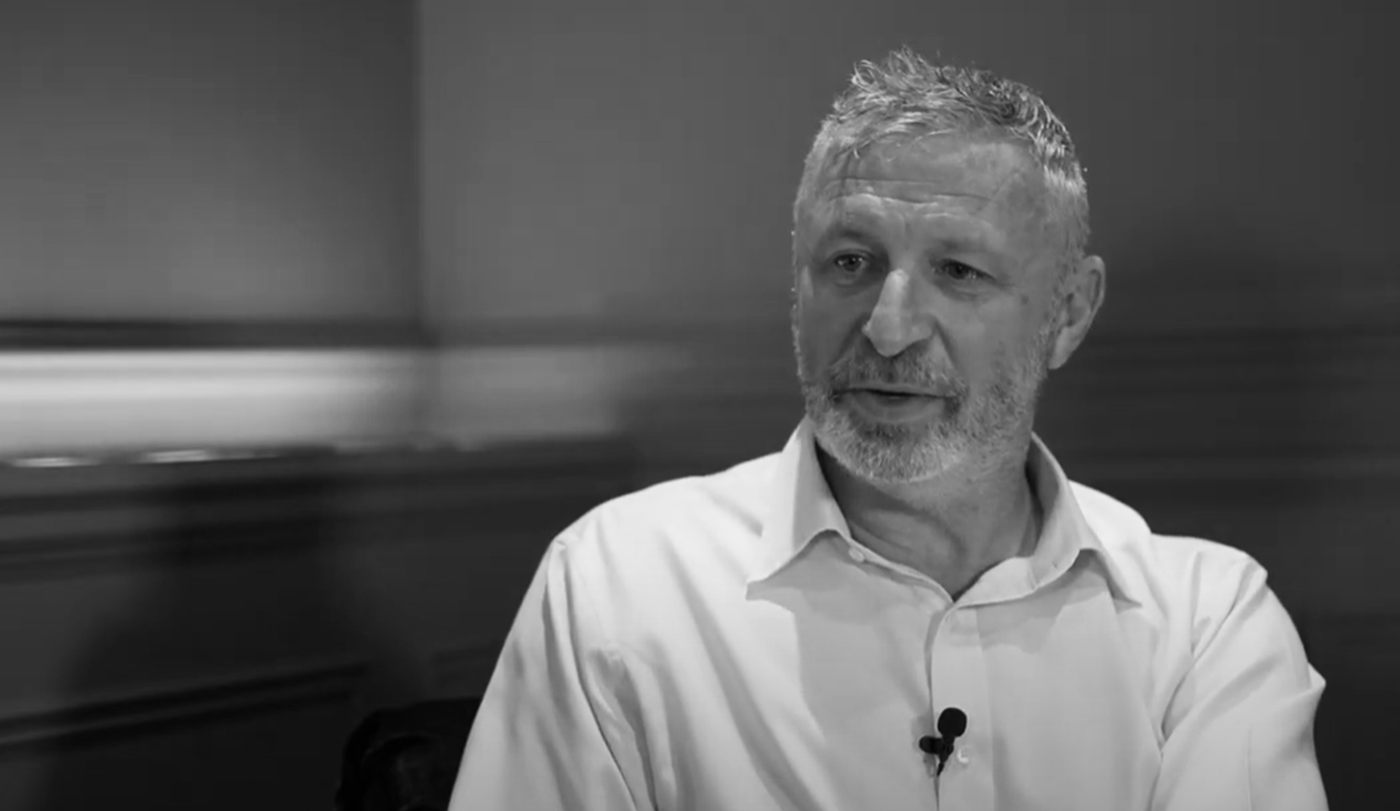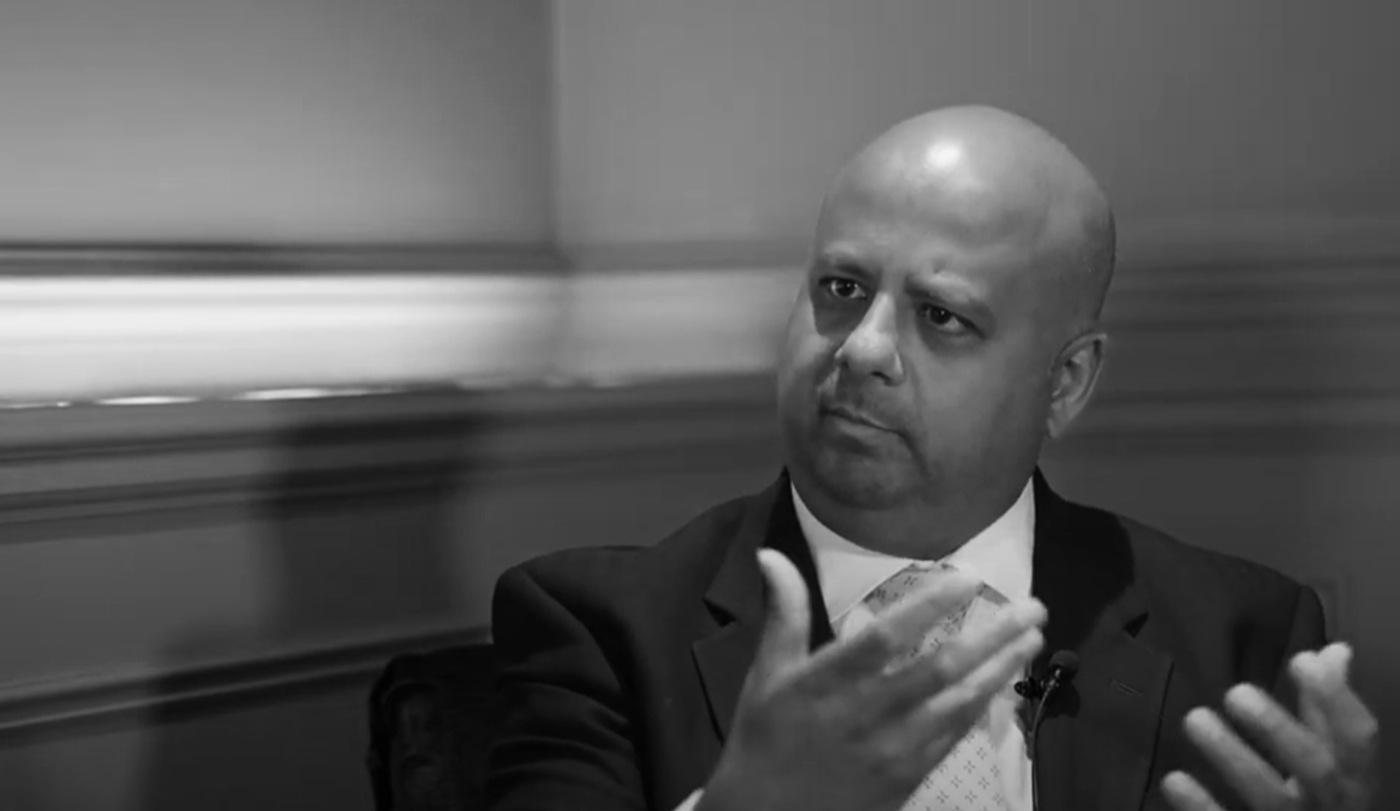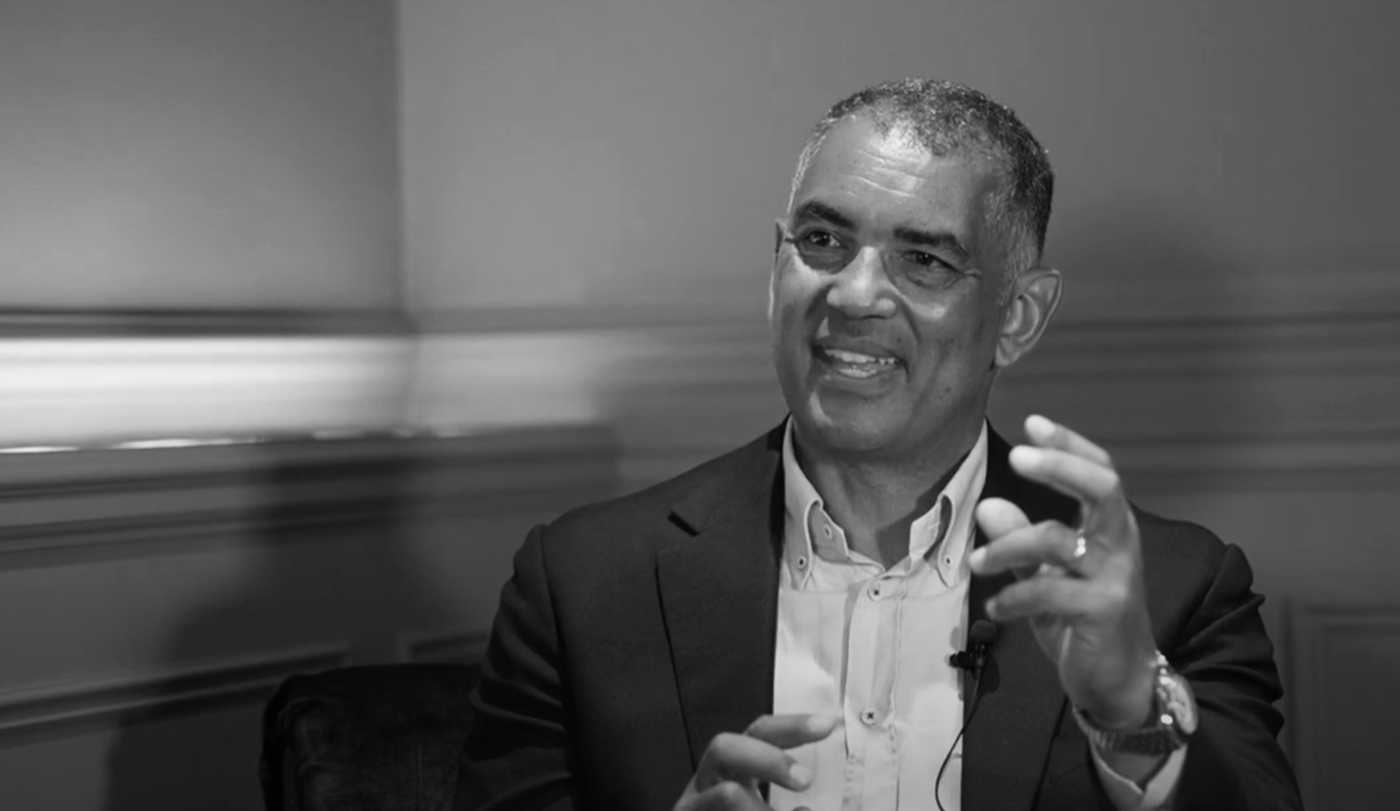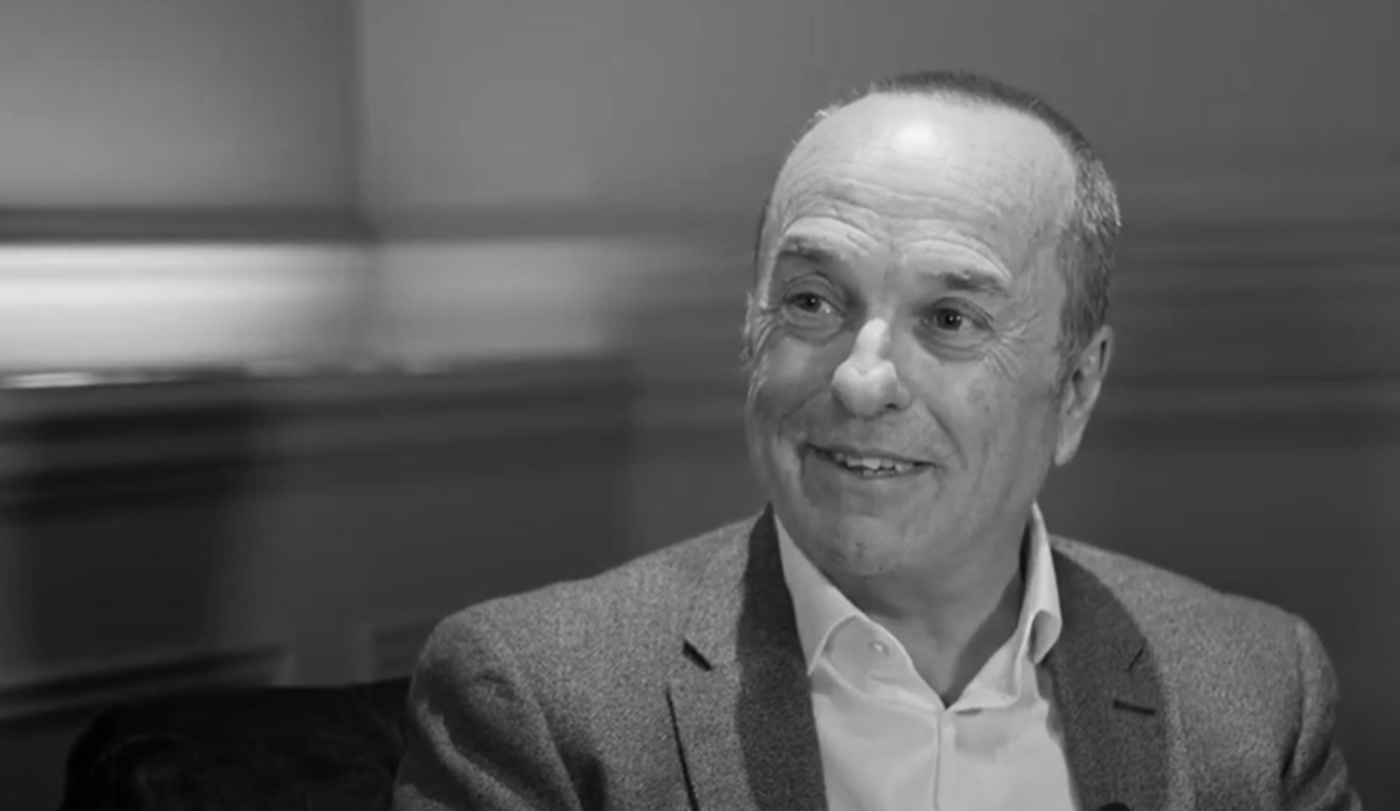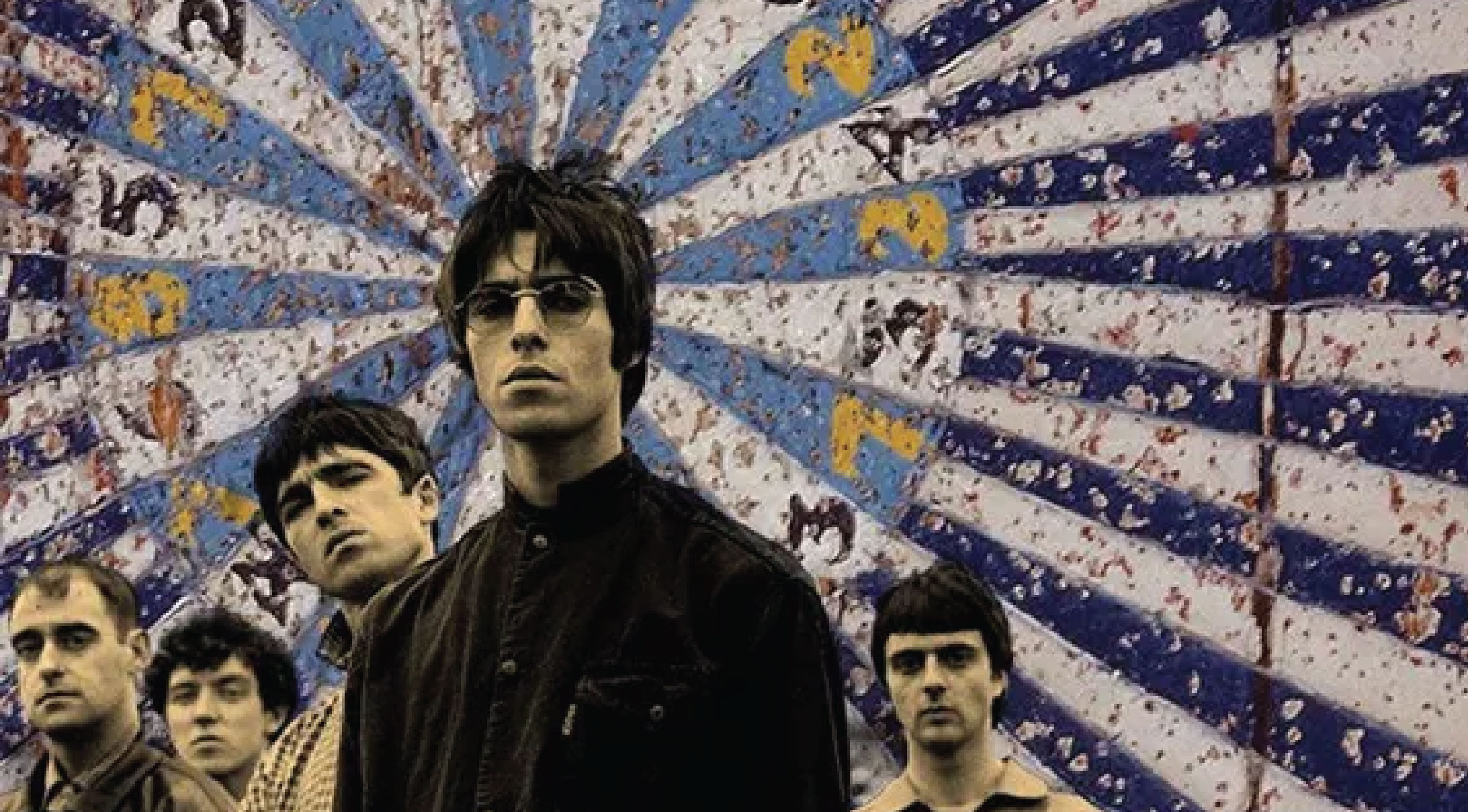On learning the right lessons, Trump and US debt, and sound advice for presentation novices
In our regular video series, we interview the wealth sector’s key decision-makers to discover how they think about life, both within the world of investment and beyond it; what brought them into the business and what keeps them here; and what makes them and their companies tick
Justin Oliver, CIO at Canaccord Genuity Funds, is hardly alone in pinpointing the dotcom boom and bust as the scene of his biggest investment mistake but he makes a telling point when he goes on to highlight the risks of learning any lessons from that mistake almost too well.
“Like a lot of people towards the end of the 1990s, I probably got a little bit caught up in the hyperbole of the first technology bubble,” he tells Wealthwise editorial director Julian Marr in our latest Choice Words episode. “The internet was obviously a new thing and I probably went a bit too large into technology investments.
“In 1999, I had a pure tech-company portfolio, which was obviously doing extremely well – I made something like 115% in the fourth quarter alone – and obviously I thought I could walk on water! I remember one particular client wanted an even more aggressive portfolio, though – and eventually he decided he could dispense with my services and do it himself. He got his own Bloomberg machine and went full gung-ho right at the peak – and, as you might imagine, pretty much lost his shirt.”
A quarter of a century later, then, is that experience informing Oliver’s thinking in the current market clamour for all things AI? “Possibly,” he replies carefully. “Although, maybe I am actually now a bit too sceptical because I have been through that cycle before – where you just thought everything was going to be great.
“What I find notable, however, is during the tech bubble we would not have identified the current ‘Magnificent Seven’ as the market leaders of 25 years later. You know, Alphabet had only just been launched while Facebook wasn’t around – it was all about Myspace at that time.
When we are thinking about which companies are going to be the largest in, let’s say, 2035, there might actually be ones we have never even heard of yet – and they will be launched on the back of AI.”
“Obviously Tesla wasn’t around. Microsoft was and Apple too but it was more niche – just computers. Amazon was only selling books – and then very nearly went bust shortly thereafter. So it is quite interesting – we tend to think the top 10 companies in the world are almost inviolable and they are always going to be there.
“Yet, if you look back in history, buying the largest companies in the world often isn’t a good strategy. So for me, when we are thinking about which companies are going to be the largest in, let’s say, 2035, there might actually be ones we have never even heard of yet – and they will be launched on the back of AI.”
Predictably unpredictable
Earlier on in the conversation, when asked what most excites and most worries him about the current investment outlook, Oliver offers the same two-word answer. “Donald Trump excites me a lot because he is going to create lots of investment opportunities,” he says. “And, actually, I think those investment opportunities will be outside of the US, which is quite unusual since the financial crisis. I think there are only three calendar years since 2008 where stocks outside the US outperformed – and this could be the fourth.
“And the biggest danger? Donald Trump! We know that, if there is one predictable thing about Donald Trump, it is his unpredictability. That is a danger. Over the years I have been doing this job, one question I have been repeatedly asked about is the debt situation in the US – how does it play out? What will be the tipping point?
“Obviously, the answer generally is ‘I don’t know’ – but he is not going to improve that situation. As we speak, it is $36tn-worth of debt. It is going to get worse by $2.5tn, people say – reaching $40tn by 2040. I suspect it will be earlier than that, however, so that is the one thing that potentially keeps me up at night.”
Finally, through the advice he would like to have given himself on his first day in investment, Oliver offers some words of encouragement to anyone who worries about giving presentations. “I remember, when I first started, just how nervous I was but it does take time and experience,” he observes.
“So I think I would tell my younger self, Have confidence in your own ability. Remain humble, where possible. And it just comes with practice and experience. You will screw up from time to time when giving presentations but, most often, it is only you who will notice that – not the audience. So I would say, You’ll be fine. It will come good eventually. Just keep at it.”
A full transcript of this episode can be found after this box while you can view the whole video by clicking on the picture above. To jump to a specific question, just click on the relevant timecode:
00.00: What excites you about the current investment outlook? What worries you?
02.15: What do you most look for in an individual investment? What constitute ‘red flags’?
03.42: To what degree should professional investors be thinking beyond so-called ‘traditional’ investments? Towards what?
05.34: What is your approach to client communications?
07.15: What was your path into investment – and, if you had not taken it, what do you think you would be doing now?
09.00: What is the biggest investment mistake you are prepared to admit to – and what did you learn from it?
12.20: Outside of work, what is the strangest thing you have ever seen or done?
13.10: What are your best and worst-case scenarios for the future of wealth in the UK?
15.45: What advice would you have given your younger self on your first day in this business?
16.40: Two ‘Choice Words’ recommendations, please – one a book; one a free choice?
Transcript of ‘Choice Words’ Episode 17:
Justin Oliver, with Julian Marr
JM: Well, hello and a very warm welcome to another in our series of ‘Choice Words’ videos where we get to meet the great and the good of fund selection and fund research. I am Julian Marr, editorial director of Wealthwise, and today I am delighted to be talking to Justin Oliver, who is CIO at Canaccord Genuity Funds. Hi Justin.
JO: Hello, Julian.
JM: Let’s jump straight into my first question. The investment outlook – what excites you about it? What worries you?
JO: What excites me? Donald Trump actually excites me a lot – because he is going to create lots of investment opportunities. And, actually, I think those investment opportunities will be outside of the US, which is quite unusual since the financial crisis.
I think there are only three calendar years since 2008 where stocks outside the US outperformed – and I think this could be the fourth year. We saw that in the first quarter, when obviously US stocks underperformed by a very large margin – so I think he will create opportunities.
Where Trump will also create opportunities is in things to talk about. In this industry, we all like to talk a lot – very often it is macroeconomics and so on, which can get a little bit tedious but he is going to give us lots to talk about moving forward. So that, I think, is what excites me most.
Biggest danger? Donald Trump! We know that, if there is one thing that is predictable about Donald Trump, it is his unpredictability. That is a danger. Over the months and the years I have been doing this job, one question I have been repeatedly asked about is the debt situation in the US – how does it play out?
What will be the tipping point? Obviously, the answer generally is ‘I don’t know’ – but he is not going to improve that situation. As we speak, it is $36tn-worth of debt. It is going to get worse by – what? – they say $2.5tn, reaching $40tn by … I think they are saying 2040. I suspect it will be earlier than that. So that is the one thing that potentially keeps me up at night – but I don’t know what the answer is.
No nasty surprises
JM: No – and hopefully you get to sleep eventually. That is a great start – and the phrase ‘Donald Trump excites me’ is always a good way to kick off an interview so let’s keep it up. You mentioned being careful talking about the macro so let’s jump straight to the micro – with individual investments, what are the key points you look for on the plus side? And what would you see as a red flag?
JO: Sure. Well, in terms of investments – again, I have been doing this for 30 years and, really, I was brought up as a fund selector. These days, I do a little less of that – I’ll leave that to the cleverer and younger people in the firm! Still, in my investment history, what I have tended to look for is consistency and predictability – as much as you can get that. Obviously, predictability over the short term is very difficult to get but what I want to do is invest in something and I don’t get any nasty surprises at the end of it.
Red flags for me – well, having done hundreds upon hundreds of fund manager interviews over the years, we know that, in the industry, you do occasionally come across people who can be a little bit arrogant. That is something that is definitely a red flag to me. I will invest in fund managers whom I would invest in myself – and I won’t stick with fund managers who can be a little bit conceited from time to time, shall we say.
All-important factor
JM: OK – so we will carry on that conversation after we stop filming! Something that is coming up more and more nowadays is alternative investments – however you want to define that. To what degree do you believe you and your clients need to be thinking about alternatives compared with the more ‘traditional’ cash, bonds and equities?
JO: So what are we including as alternatives? That is the big question. Commodities – are they alternatives? Potentially. We have obviously got some gold within our portfolios. You know, long/short hedge funds – we’ll steer away from them because one lesson we’ve learned over the years is, actually, liquidity is all-important. And particularly now, with Mr Trump in charge, if things change, we want the ability to change our portfolios around very quickly, should the need arise. We learnt that from the financial crisis of 2008/09.
So there is that – and then a question that very often comes up is about crypto, which is the ‘new alternative’, if you like. I am probably one of the most arch crypto-sceptics out there. I do not believe you can value a bitcoin. I have no ability to predict whether it is going to go up or down over, say, the next 12 months.
With every asset, I think you have to be able to get a valuation of some description – and I couldn’t tell you what a bitcoin should be worth. People then say, Well, yes – but it’s the same with gold, isn’t it? I would argue, though, gold does actually have very limited industrial uses – and at least it has been around for several thousand years as a medium of exchange and a store of value. So alternatives, yes – in a very minor way. But, again, the liquidity is all-important.
Talk to clients – not at them
JM: Excellent. What is your approach to client communications and, more specifically, how do you seek to keep your investors along for the entirety of the ride so they actually benefit fully from your wisdom?
JO: ‘Wisdom’ is probably quite a strong word there! Still, what I have learned over the years is to keep it simple – and people like stories, basically. So, look, I might find it interesting that US inflation has gone from 2.6% to 2.8% and I’m sure I could put together a presentation on macroeconomics. But even with the most, shall we say, hardened client – institutional client, whatever it might be – very often that doesn’t excite them.
What excites them is what is going on in the world in simple terms – let’s put a story around that. And, again, we get that with Donald Trump at this moment in time. And, actually, we are just putting what we think into a real-world context. Take our current market-update presentations – we are talking about gold because people can relate to that – they understand what we think is driving the gold price.
And AI at the moment – that is a great investment to talk about because clients and investors understand it. We have all got phones – it is very relatable investment and we can talk about various ways of accessing that and how much exposure we have within our portfolios. So very much ‘keep it simple’. Try to not to use acronyms – we love doing that in this industry but we try to use those as infrequently as possible. And just talk to people – don’t talk at them, basically.
The rest is history
JM: Very good. A more personal question, now – what was your path into investment and, if you had not taken it, in an alternative universe, what do you think you would be doing now?
JO: At the beginning of the 1990s – just finishing my A levels and about to go to university – I applied for sponsorship from what was then Kleinwort Benson. I was very fortunate to get said sponsorship. There were no obligations upon me, except it gave me the opportunity to work at the bank during holidays and so on, which I duly took up – being the poor, impoverished student I was. My first placement was in the investment division and I then came back every time to work in that division and the rest, as they say, is history – 30 years later.
If I wasn’t doing that, I would probably be doing your job, actually. I always had quite an interest in journalism, words, writing, English and so on. So, if I hadn’t gone into the investment industry directly, it would have been some form of journalism. I would like to be a writer but I don’t think my imagination is quite up there. So something to do with journalism – whether it is investments or more broadly, I don’t know – but that’s probably what I’d be doing.
JM: If you had done that, you would have stayed impoverished for a bit longer than just your student days – so you may well have made the right choice! Of course, we do it for love – oh, and obviously for the joy of informing our readers and so on.
Scepticism as a risk
JM: What is the biggest investment mistake you are prepared to admit to? And what did you learn from it?
JO: Well, after 30 years, I am still racking them up! But it probably comes down to the end of the 1990s, I would say, and the first technology bubble. Like a lot of people in the industry at the time, I probably got a little bit caught up in the hyperbole. The internet was obviously a new thing – no-one had really experienced it before – and I probably went a bit too large into technology investments.
I remember one particular client – I had a pure technology-company portfolio, which was, obviously, doing extremely well – and, during 1999, he wanted an even more aggressive technology portfolio! I remember I made something like 115% – in the fourth quarter of 1999 alone – and obviously I thought I could walk on water! Yet the client decided he could dispense with my services and do it himself. He got his own Bloomberg machine and so on and went full gung-ho right at the peak – and, as you might imagine, pretty much lost his shirt.
JM: And presumably found a way to blame it on you!
JO: Yes – one of my best exit positions, as far as that’s concerned! But, yes, it was like anything – I probably got a bit too caught up in it at that moment.
JM: And it does feels like there is an echo of that now on the AI front, with DeepSeek and the rest of it, but 25 years on, presumably that is informing your thinking more?
JO: Possibly. Although, maybe I am actually a bit too sceptical because I have been through that cycle before, where you just thought everything was going to be great. What is notable, I think, is at the tech bubble, we would not have identified the current Magnificent Seven as the leaders of what would be around 25 years later. You know, Alphabet had just been launched. Facebook wasn’t around and it was all about Myspace at that time.
Obviously Tesla wasn’t around. Microsoft was there, Apple was there but it was more niche – just computers. Amazon was only selling books – and then very nearly went bust shortly thereafter. So it is quite interesting – we almost think the top 10 companies in the world are inviolable and they are always going to be there. Yet, if you look back in history, buying the largest companies in the world often isn’t a good strategy.
Go back to 2010 and it was only Apple and Microsoft that were the largest companies in the world. At the beginning of the 2000s, it was only Microsoft. The 1990s was all about Japanese companies. So for me, when we are looking at everything and thinking in, let’s say, 2035, which are the companies that are going to be the largest? Actually, there might be certain companies we have never even heard of yet – and they will be launched on the back of AI. So it is an interesting time and, again, it goes back to the exciting investment opportunities that are around at the moment.

Sow bizarre
JM: Good stuff. Outside of work, what is the strangest thing you have ever seen or done?
JO: Probably someone walking a pig – in Canada. Just walking down the road, taking their pig for a walk, was probably one of the strangest things I’ve come across, basically.
JM: Just heading to market? Or part of a fairy tale!
JO: I don’t know. I just remember someone remarking, Oh my God – it’s a freaking pig. It was just strange!
JM: Well, that is very much in keeping with the origin of this question. I remember seeing a comedy routine where a guy went through this long list of, I’ve seen this, I’ve seen that – but I ain’t never seen the things I saw the day I rode the ‘Hound, as in Greyhound bus. So your answer is in the spirit of that.
Costs of doing business
JM: Great. Back to a more grown-up question, then – what are your best and worst-case scenarios for the future of wealth in the UK?
JO: It’s a difficult one. We obviously have the City of London and that is very much embedded in the culture. Obviously, I am based in Jersey – so maybe slightly distinct from that – but I think the best case is the UK, London, remains that centre of wealth management in western Europe. What concerns me, certainly in the Channel Islands, is some of the costs of doing business. It is not particularly cheap – and I guess the same is true in London, as well – and you are comparing that to other jurisdictions where it might be cheaper to do business.
We sort of see it, for us, sometimes trying to encourage new entrants into the industry – which isn’t as easy as you might think it would be, because maybe sometimes it does not seem quite as exciting as working with AI and all these other cutting-edge industries. You know, financial planning is maybe not for everyone. So I think maybe one of the dangers is we still have to try to encourage younger people into the industry.
JM: It is ridiculous, isn’t it? In America, financial planning is seen as very much an aspirational profession – and not so much here. And I had no idea, when you mentioned Kleinwort Benson, about the sponsor angle – like, I knew it existed for the Army, for example, where they hope you stick around. And you did actually stick around in your version of it but do those schemes still exist now? They certainly do not feel so prevalent.
I sometimes do ask the question about how one goes about attracting new talent but I think a lot of it comes down to just being seen as a place one would want to work – and, the way His Majesty’s financial services industry seems to get beaten up, it does not always feel like that. I should admit my geography let me down on this question – I was desperately trying to think what was the broadest way of talking about the UK! I should have said the ‘British Isles’ and then I would have included Jersey. Still, let’s take advantage of that – you mentioned cost but is there any other twist to the wealth sector in Jersey we may not see on the mainland?
JO: No, I think it is broadly not dissimilar – apart from the cost element. And maybe sometimes there is not the talent on the island you might otherwise have and you maybe need to look further abroad. But no – not massively different.
Just keep at it
JM: All right. One very quick question, now – going back to those times at KB, back in the 1990s, what advice would you have given your yourself on the first day in the job?
JO: I remember, when I first started giving presentations, just how nervous I was – and it does take time and experience to start to build that up. So I think I’d say to my younger self, Have confidence in your own ability. Remain humble, where possible. And it just comes with practice and experience. You will screw up from time to time when giving presentations but, most often, it is only you who will notice that – not the audience. So I would say to my younger self, You’ll be fine. It will come good eventually. Basically – just keep at it.
That’s entertainment
JM: Very good. Last question – we call this ‘Choice Words’ because of the choices you make for a living but this is more about personal recommendations. The rules of the game are, one book – it does not have to be investment-related – and the other one is a free hit. Any recommendation at all although – and I am sorry – given we are here in Jersey, I cannot resist a Bergerac reference. Was Charlie Hungerford’s club in St Helier!
JO: For a book recommendation, I feel I should give some highbrow answer like The Psychology of Money or something like that – but that’s just not me. Actually what I like – and, again, it is going back to the communication side – is people like Michael Lewis and Tim Harford, who talk about investment-related matters but do so in a storytelling kind of way, such as Liar’s Poker for Michael Lewis or The Undercover Economist for Tim Harford. I just find that really interesting. So anyone who can tell me a good story around the investment industry, I quite like – so make sure you get your full exposure to that.
JM: Oddly enough, Morgan Housel’s The Psychology of Money has been my recommendation a number of times. That is a brilliant book – but, if I could write like one person, I would love to write like Michael Lewis. It is sick-making when I read his books – he makes things so entertaining.
JO: That is absolutely right. In terms of the other recommendation, again, I will say the Channel Islands, right – not just Jersey or Guernsey. I am a Guernsey boy – born and bred for 50-odd years – who moved to Jersey last year. And since I’ve moved, the question I’ve been often asked is, Jersey or Guernsey – what’s your favourite? So I normally dodge that …
JM: Much safer move!
JO: It is. They both have their plusses and minuses. I think St Peter Port is pretty than St Helier but I think some of the beaches Jersey has are better than Guernsey. But both are fantastic places to live, work and raise a family – very safe and people are very friendly, on the whole. So my other recommendation is, if you have never been to the Channel Islands, make sure you come. Try to visit as many of them as you can, including Herm and Sark, which are also beautiful places to go.
JM: So there you go. Choice Words – brought to you this week by the Channel Islands Tourist Authority. I just need to make sure I get the sponsorship sorted out. Justin, that was great – really entertaining. Thank you so much for your time.
JO: No problem at all! Thank you, Julian.
JM: And thank you very much for watching. Please do look out for further Choice Words videos as they are published.


